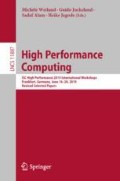Abstract
This paper describes how to use the Singularity containerization tool in a HPC cluster equipped with GPU accelerators. The application chosen for benchmarking is Tensorflow, the open-source software library for machine learning. The singularity containers built have run into GALILEO HPC cluster at CINECA. A performance comparison between bare metal and container executions is also provided, showing a negligible difference in the number of images computed per second.
Supported by Prace - Partnership for Advanced Computing in Europe - 5IP, http://www.prace-ri.eu/.
Access this chapter
Tax calculation will be finalised at checkout
Purchases are for personal use only
References
Docker. https://www.docker.com/
Kurtzer, G.M., Sochat, V., Bauer, M.W.: Singularity: scientific containers for mobility of compute. PLoS ONE 12(5), e0177459 (2017). https://doi.org/10.1371/journal.pone.0177459
Singularity. https://www.sylabs.io/
PBS Pro. https://www.pbspro.org/
Slurm. https://slurm.schedmd.com/
Tensorflow. https://www.tensorflow.org/
GALILEO cluster user documentation. https://wiki.u-gov.it/confluence/display/SCAIUS/UG3.3%3A+GALILEO+UserGuide
Docker Hub. https://hub.docker.com/
Singularity Hub. http://singularity-hub.org/
Tensorflow Performance benchmarks. https://www.tensorflow.org/guide/performance/benchmarks
Tensorflow Docker Hub. https://hub.docker.com/r/tensorflow/tensorflow/
Krizhevsky, A., Sutskever, I., Hinton, G. E.: Imagenet classification with deep convolutional neural networks. In: Advances in Neural Information Processing Systems, pp. 1097–1105 (2012)
Szegedy, C., et al.: Going deeper with convolutions. In: Computer Vision and Pattern Recognition (CVPR) (2015)
Szegedy, C., Vanhoucke, V., Ioffe, S., Shlens, J., Wojna, Z.: Rethinking the inception architecture for computer vision (2015). https://arxiv.org/abs/1512.00567
He, K., Zhang, X., Ren, S., Sun, J.: Deep residual learning for image recognition (2015). https://arxiv.org/abs/1512.03385
Simonyan, K., Zisserman, A.: Very deep convolutional networks for large-scale image recognition (2014). https://arxiv.org/abs/1409.1556
ImageNet dataset. http://www.image-net.org/
Author information
Authors and Affiliations
Corresponding author
Editor information
Editors and Affiliations
Rights and permissions
Copyright information
© 2019 Springer Nature Switzerland AG
About this paper
Cite this paper
Muscianisi, G., Fiameni, G., Azab, A. (2019). Singularity GPU Containers Execution on HPC Cluster. In: Weiland, M., Juckeland, G., Alam, S., Jagode, H. (eds) High Performance Computing. ISC High Performance 2019. Lecture Notes in Computer Science(), vol 11887. Springer, Cham. https://doi.org/10.1007/978-3-030-34356-9_6
Download citation
DOI: https://doi.org/10.1007/978-3-030-34356-9_6
Published:
Publisher Name: Springer, Cham
Print ISBN: 978-3-030-34355-2
Online ISBN: 978-3-030-34356-9
eBook Packages: Computer ScienceComputer Science (R0)

